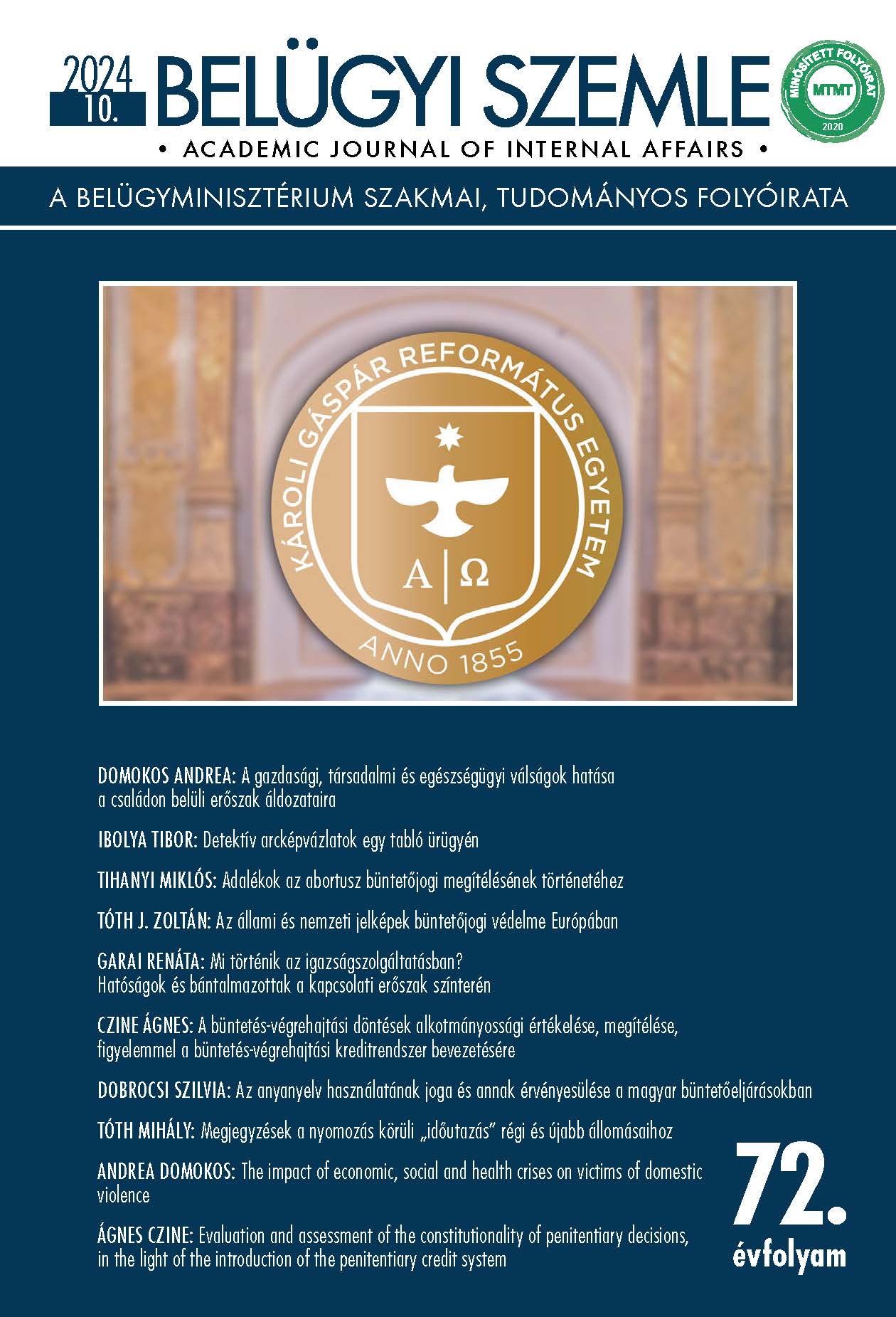Abstract
Aim: To examine how the social and, at the same time, legal perception of induced abortion has changed since the Middle Ages. Examining the criminal law norms seems to be a good indicator of this because these norms are meant to play the role of a capstone for the protection of social values.
Methodology: Processing and analysis of legal norms and literature data from a historical perspective. A value-oriented analysis of the mentioned sources accompanies this.
Findings: The normative system of the middle ages was permeated by the Christian religion and the morality based on it. Thus, at this age, there was no doubt that taking away the life of the fetus was a sin and a crime as well. This rule prevailed in later times until 1945. The abortion ban that remained after the communist takeover was based on entirely different moral foundations. It was based on the fact that workers are needed for social development, and taking away fetal life deprives socialist society of this resource. State socialism later relaxed the rules. This change was followed by the criminal law with a significant lag until finally, in 1962, only illegal abortion was punishable. The changes after the regime change consolidated the legislative attitude according to which the fetus is not a human being. The criminal law norms are also in line with this.
Value: Historical outline of the protection of fetal life, with particular regard to its protection under criminal law. Changes in European culture led to the development of different images of people. An imprint of these is the protection of fetal life.
References
Balogh Á. & Tóth M. (Szerk.) (2010). Magyar büntetőjog általános rész. Osiris Kiadó.
Barna A. (2010). Törekvések a politikai bűncselekmények rendezésére Magyarországon a 18. század végén, és az 1795. évi büntető törvénykönyv tervezete. Jog-Állam-Politika, 2(2), 73–97.
Bihari O. (1973). Alkotmányreformunk jelentősége. Jogtudományi Közlöny, 28(2), 57–64.
Boehm K. (1833). A gyermekölésről orvostörvényi tekintetből. Tudományos Gyűjtemény 17(4), 57–84.
Faragó T. (2011). Bevezetés a történeti demográfiába. Budapesti Corvinus Egyetem.
Gyémánt R. & Katona T. (2014). Demográfia. Pólay Elemér Alapítvány.
Haldane, J. & Lee, P. (2003). Aquinas on Human Ensoulment, Abortion and the Value of Life. Philosophy, 78(2), 255–278. https://doi.org/10.1017/S0031819103000275
Harkányi E. (1905). A holnap asszonyai. Tanulmány a társadalomtudomány köréből. Politzer Zsigmond és Fia kiadása.
Horváth T. (1964). A Nemzetközi Büntetőjogi Társaság IX. Kongresszusa a család és a nemi erkölcs elleni bűncselekmények büntetőjogi szabályozásáról. Jogtudományi Közlöny, 19(12), 660–668.
Jobbágyi G. (1987). A terheség művi megszakítása – polgári jogi kérdőjelek. Jogtudományi Közlöny, 42(9), 487–493.
Kárpáti L. (1953). A magzatelhajtás büntetőjogi kérdései. Rendőrségi Szemle, 1(4), 310–321.
Kocsis P. (2016) "Aki ettől a naptól fogva abortuszt hajt végre, azt a legkeményebben büntetjük.": Abortuszellenes propaganda az ötvenes évek elején. Archivnet, 16(3), 915–995.
Kovács I. (1937). A néma forradalom. Cserépfalvi Kiadó.
Mezey B. (Szerk.) (2004). Magyar Jogtörténet. Osiris Kiadó.
Németh Gy. (1992). Volt-e Ratkó-törvény? Társadalmi Szemle 47(12), 81–92.
Pető A. (1999). Átvonuló hadsereg, maradandó trauma. Az 1945-ös nemi erőszak esetek emlékezete. Történelmi Szemle, 41(1-2), 85–107.
Petrik F. (1972). Az országgyűlés elfogadta az Alkotmány módosításáról szóló törvényt. Magyar Jog, 18(4), 193–195.
Rakovszky I. (1866). Az őskor jogtörténelmi és nemzetközi viszonyai (Laurent F. után). Jogtudományi Közlöny, 1(36), 571–574.
Révai T. (1949). A magzatelhajtás büntetése a szovjet jogban. Jogtudományi Közlöny 4(19), 419–422.
Szabó A. F. (1991). Sorscsapás, vagy válságtünet? (A paraszttársadalom válsága és az egykekérdés Erdei Ferenc munkáiban). Társadalomkutatás, 9(4), 36–41.
Sz. N. (1915). In Révai Nagy Lexikona 13. kötet Lovas-Mons. Révai Testvérek Irodalmi Intézet.
Sz. N. (1946). Megdöbbentő mértékben emelkedett a magzatelhajtások száma. Világ, 36(285), 6.
Szilárd Ö. (1911). A magzatelhajtás jogi és szociális szempontból. Huszadik század, 12(1), 161–173.
Vastagh P. (2017). Alkotmányrevízió 1972: kitörési kísérlet vagy korrekcióspróbálkozás. Múltunk, 62(2), 203–244.
Zakariás K. (2019). Az élethez és az emberi méltósághoz való jog. In Schanda B. & Balogh Zs. (Szerk), Alkotmányjog – Alapjogok. (pp. 365–385). Pázmány Press.

This work is licensed under a Creative Commons Attribution-NonCommercial-NoDerivatives 4.0 International License.
Copyright (c) 2024 Academic Journal of Internal Affairs

